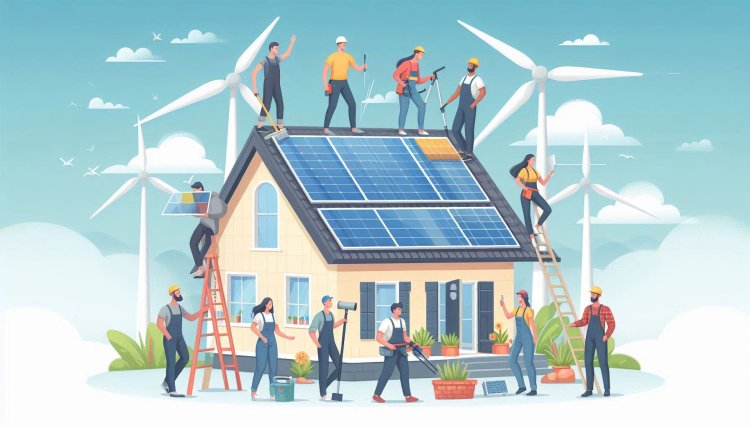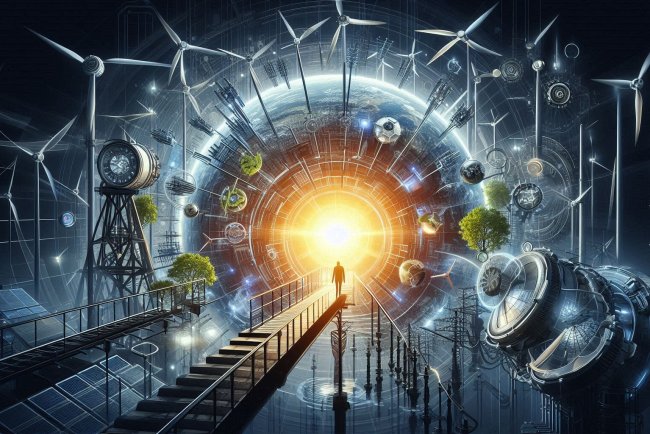Renewable Energy and Energy Efficiency
Discover the latest trends and technologies in Renewable Energy and Energy Efficiency to help create a sustainable future for our planet.

Renewable Energy and Energy Efficiency
Renewable energy and energy efficiency are crucial components in the global effort to combat climate change and transition to a more sustainable energy future. Renewable energy sources such as solar, wind, hydroelectric, and geothermal power offer clean and sustainable alternatives to traditional fossil fuels. Energy efficiency measures focus on reducing energy consumption and waste, making the most of available resources. Together, these two strategies play a key role in reducing greenhouse gas emissions, enhancing energy security, and promoting economic growth.
Renewable Energy
Renewable energy sources provide a pathway towards a low-carbon energy system that is more resilient and less harmful to the environment. Solar power, generated from sunlight using photovoltaic cells or concentrated solar power systems, is one of the fastest-growing renewable energy sources. Wind power, harnessed through turbines that convert wind into electricity, is another popular and efficient form of renewable energy. Hydroelectric power, derived from flowing water in rivers or dams, has been a reliable source of renewable energy for decades. Geothermal power, extracted from heat stored beneath the Earth's surface, is also a promising renewable energy source.
Renewable energy technologies have advanced significantly in recent years, leading to cost reductions and increased efficiency. As a result, renewable energy is now competitive with traditional fossil fuels in many markets. Governments, businesses, and individuals are increasingly investing in renewable energy projects to reduce carbon emissions, create jobs, and stimulate economic growth.
Energy Efficiency
Energy efficiency measures focus on reducing energy consumption through improved technology, building design, and behavior changes. By using energy more efficiently, we can achieve the same level of energy services while using less energy overall. Energy efficiency not only helps to reduce greenhouse gas emissions but also lowers energy costs, improves air quality, and enhances energy security.
Energy efficiency can be achieved through various strategies, including upgrading appliances and equipment to more efficient models, improving insulation and sealing in buildings to reduce heating and cooling needs, optimizing industrial processes to minimize energy waste, and promoting energy-saving behaviors such as turning off lights and unplugging electronics when not in use.
Government policies and programs play a crucial role in promoting energy efficiency by setting standards for energy performance, providing financial incentives for energy savings, and raising awareness about the benefits of energy-efficient practices. Businesses and individuals can also contribute to energy efficiency by investing in energy-saving technologies, implementing energy management systems, and adopting sustainable practices in their daily lives.
Benefits of Renewable Energy and Energy Efficiency
Renewable energy and energy efficiency offer a wide range of benefits to society, the economy, and the environment. By reducing reliance on fossil fuels, renewable energy helps to mitigate climate change, improve air quality, and protect natural resources. Energy efficiency measures lower energy costs, create jobs in the clean energy sector, and enhance energy security by reducing dependence on imported fuels.
Investing in renewable energy and energy efficiency also stimulates economic growth and innovation. The renewable energy industry has seen significant growth in recent years, creating new job opportunities and driving technological advancements. Energy efficiency measures lead to cost savings for businesses and households, freeing up resources for other investments and activities.
Furthermore, renewable energy and energy efficiency contribute to sustainable development by promoting social equity and environmental justice. By expanding access to clean energy and reducing energy poverty, these strategies help to improve living conditions and quality of life for communities around the world. Energy efficiency programs can also benefit low-income households by lowering energy bills and improving indoor comfort.
Challenges and Opportunities
Despite the many benefits of renewable energy and energy efficiency, there are still challenges that need to be addressed. The intermittent nature of renewable energy sources such as solar and wind power can pose challenges for grid integration and energy storage. Energy efficiency measures face barriers such as upfront costs, lack of awareness, and resistance to change.
However, these challenges also present opportunities for innovation and collaboration. Advances in energy storage technology, grid management systems, and demand response programs are helping to overcome the limitations of renewable energy sources. Education and outreach efforts can raise awareness about the benefits of energy efficiency and inspire behavior changes at the individual and community level.
Conclusion
Renewable energy and energy efficiency are essential components of a sustainable energy future that prioritizes environmental protection, economic growth, and social equity. By investing in renewable energy sources and energy efficiency measures, we can reduce greenhouse gas emissions, lower energy costs, and create a more resilient and equitable energy system.
What's Your Reaction?
















